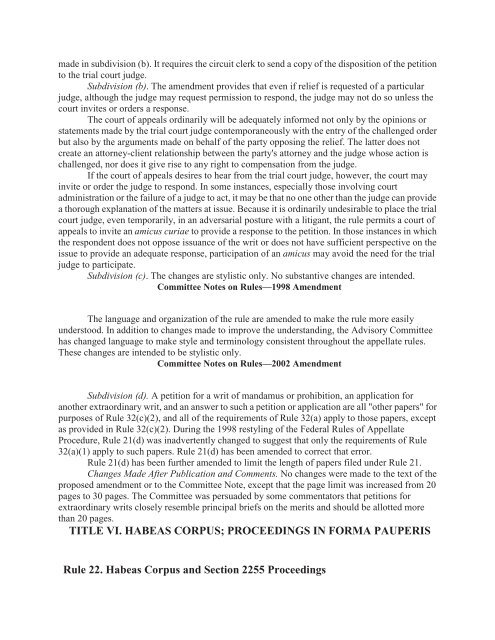Federal Rules of Appellate Procedure 2014-2015, 2014a
Federal Rules of Appellate Procedure 2014-2015, 2014a
Federal Rules of Appellate Procedure 2014-2015, 2014a
You also want an ePaper? Increase the reach of your titles
YUMPU automatically turns print PDFs into web optimized ePapers that Google loves.
made in subdivision (b). It requires the circuit clerk to send a copy <strong>of</strong> the disposition <strong>of</strong> the petition<br />
to the trial court judge.<br />
Subdivision (b). The amendment provides that even if relief is requested <strong>of</strong> a particular<br />
judge, although the judge may request permission to respond, the judge may not do so unless the<br />
court invites or orders a response.<br />
The court <strong>of</strong> appeals ordinarily will be adequately informed not only by the opinions or<br />
statements made by the trial court judge contemporaneously with the entry <strong>of</strong> the challenged order<br />
but also by the arguments made on behalf <strong>of</strong> the party opposing the relief. The latter does not<br />
create an attorney-client relationship between the party's attorney and the judge whose action is<br />
challenged, nor does it give rise to any right to compensation from the judge.<br />
If the court <strong>of</strong> appeals desires to hear from the trial court judge, however, the court may<br />
invite or order the judge to respond. In some instances, especially those involving court<br />
administration or the failure <strong>of</strong> a judge to act, it may be that no one other than the judge can provide<br />
a thorough explanation <strong>of</strong> the matters at issue. Because it is ordinarily undesirable to place the trial<br />
court judge, even temporarily, in an adversarial posture with a litigant, the rule permits a court <strong>of</strong><br />
appeals to invite an amicus curiae to provide a response to the petition. In those instances in which<br />
the respondent does not oppose issuance <strong>of</strong> the writ or does not have sufficient perspective on the<br />
issue to provide an adequate response, participation <strong>of</strong> an amicus may avoid the need for the trial<br />
judge to participate.<br />
Subdivision (c). The changes are stylistic only. No substantive changes are intended.<br />
Committee Notes on <strong>Rules</strong>—1998 Amendment<br />
The language and organization <strong>of</strong> the rule are amended to make the rule more easily<br />
understood. In addition to changes made to improve the understanding, the Advisory Committee<br />
has changed language to make style and terminology consistent throughout the appellate rules.<br />
These changes are intended to be stylistic only.<br />
Committee Notes on <strong>Rules</strong>—2002 Amendment<br />
Subdivision (d). A petition for a writ <strong>of</strong> mandamus or prohibition, an application for<br />
another extraordinary writ, and an answer to such a petition or application are all "other papers" for<br />
purposes <strong>of</strong> Rule 32(c)(2), and all <strong>of</strong> the requirements <strong>of</strong> Rule 32(a) apply to those papers, except<br />
as provided in Rule 32(c)(2). During the 1998 restyling <strong>of</strong> the <strong>Federal</strong> <strong>Rules</strong> <strong>of</strong> <strong>Appellate</strong><br />
<strong>Procedure</strong>, Rule 21(d) was inadvertently changed to suggest that only the requirements <strong>of</strong> Rule<br />
32(a)(1) apply to such papers. Rule 21(d) has been amended to correct that error.<br />
Rule 21(d) has been further amended to limit the length <strong>of</strong> papers filed under Rule 21.<br />
Changes Made After Publication and Comments. No changes were made to the text <strong>of</strong> the<br />
proposed amendment or to the Committee Note, except that the page limit was increased from 20<br />
pages to 30 pages. The Committee was persuaded by some commentators that petitions for<br />
extraordinary writs closely resemble principal briefs on the merits and should be allotted more<br />
than 20 pages.<br />
TITLE VI. HABEAS CORPUS; PROCEEDINGS IN FORMA PAUPERIS<br />
Rule 22. Habeas Corpus and Section 2255 Proceedings


















